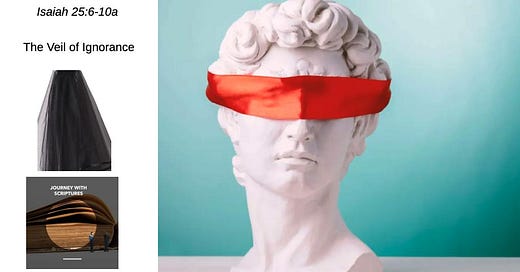Prophet Isaiah offers us yet another vision of the world that opposes what we experience in life. The vision includes a banquet for all the people that reminds me of the Eucharist celebrated across the world and attended by people of all races, tribes, and nationalities. It also includes a promise of destroying death forever that reminds me of the last book of the New Testament. When Saint John was writing about a new heaven and a new earth he quoted the words of Isaiah we hear today: "He will wipe away every tear from their eyes, and death shall be no more" (Rev 21:4; Is 26:8).
However, between the banquet for all the people and a world without death, the prophet includes a sentence about "the veil that covers all the people and the mantle cast over all the nations" (Is 25:7). In biblical parallelism "the veil" and "the mantle" refer to the same reality. But what is that reality remains an open question. I take it as a description of our predicament of ignorance. We do not know what we are doing. The best explanation of such a situation is Jesus' prayer for his persecutors and Paul's justification of his murderous desire to destroy the Church. Those who crucified Jesus did not know what they were doing and Paul, out of ignorance, imagined that persecuting Christ's followers was serving God (see Luke 23:34; 1 Tim 1:13).
The language of the veil also appears in Paul's criticism of his Jewish brothers who were unable to realise that their scriptures - our Old Testament - point to Jesus. "Even to this day when Moses is read, a veil covers their hearts" (2 Cor 3:15). And then the apostle, drawing on his former experience of ignorance and transformation, immediately says: "But when one turns to the Lord, the veil is removed" (2 Cor 3:16). Thus, the veil refers to our human experience of being conditioned by our cultural and religious background, education, and personal experience. It is through such a veil that we see reality around us unaware that it prevents us from seeing the true nature of things.
Prophet Isaiah promised that God would remove this veil. The first one to experience it was Saint Paul, the blasphemer and persecutor of the Church. It was the risen Christ who removed that veil from his mind and heart. Paul realised that he lived by a wrong theology that justified the killing of another person. Christ told him that by harming others, Paul was harming Christ. Then, the Spirit of Christ operated on Paul's heart. He removed violence and hatred and instilled a love for another human being. Since then, it did not matter anymore to Paul whether the other person was a Jew, an Arab or a Greek. He became the apostle to the nations.
This vision of Isaiah invites us to plead with the Lord to speed up the process of removing the veil of ignorance from our minds and hearts. Otherwise, in our ignorance, we will continue hurting each other, oppressing other people, and destroying the earth.




